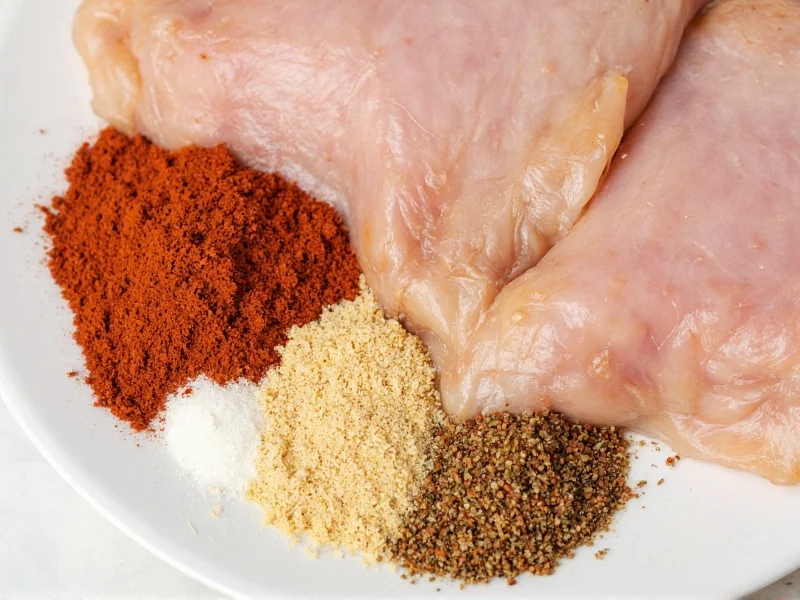Choosing the right spices transforms ordinary chicken dishes into nutrient-dense meals without compromising flavor. Health-conscious home cooks increasingly seek natural seasoning alternatives that deliver both culinary satisfaction and wellness benefits. This guide explores scientifically supported spice options that complement chicken's mild flavor while enhancing its nutritional profile.
Top 8 Healthy Spices for Chicken Preparation
Turmeric: The Anti-Inflammatory Powerhouse
Turmeric contains curcumin, a compound with well-documented anti-inflammatory properties. When preparing chicken, combine 1 teaspoon turmeric with ½ teaspoon black pepper (which increases curcumin absorption by 2000%) and olive oil. This golden spice works particularly well in baked or roasted chicken dishes. Research shows regular consumption may support joint health and reduce oxidative stress. For healthy spices to use with chicken breast, turmeric provides vibrant color and earthy flavor without overwhelming the dish.
Garlic: Immune System Support
Fresh garlic contains allicin, which studies link to cardiovascular benefits and immune support. Crush 2-3 cloves and let them rest for 10 minutes before adding to chicken to maximize allicin production. Garlic complements both white and dark meat chicken exceptionally well. Unlike salt-heavy seasoning blends, garlic enhances flavor while providing measurable health benefits. When exploring healthy chicken seasoning alternatives to salt, garlic should be your foundational ingredient.
Rosemary: Antioxidant-Rich Flavor
This woody herb contains carnosic acid, a potent antioxidant that may protect brain health. Use fresh rosemary sprigs when roasting whole chicken or chop finely for chicken cutlets. Rosemary's pine-like flavor pairs perfectly with lemon and olive oil preparations. For those researching best anti-inflammatory spices for chicken recipes, rosemary consistently ranks among top recommendations due to its high oxygen radical absorbance capacity (ORAC) score.
Thyme: Vitamin C Boost
Thyme contains significant vitamin C and has natural antimicrobial properties. Add fresh thyme during the last 5 minutes of cooking to preserve its delicate flavor and nutrients. This versatile herb works equally well in Mediterranean or French-inspired chicken preparations. When creating nutritious spices that complement chicken, thyme's subtle earthiness enhances without dominating, making it ideal for weeknight meals.
| Spice | Key Health Compounds | Recommended Amount per Pound of Chicken | Best Cooking Method |
|---|---|---|---|
| Turmeric | Curcumin | 1 tsp | Baking/Roasting |
| Garlic | Allicin | 2-3 cloves | Sautéing/Grilling |
| Rosemary | Carnosic acid | 1 tbsp fresh | Roasting |
| Thyme | Vitamin C | 1 tsp dried/1 tbsp fresh | All methods |
| Cumin | Thymoquinone | 1 tsp | Grilling/Baking |
Maximizing Health Benefits Through Proper Usage
Understanding how to properly incorporate spices ensures you receive maximum nutritional benefits. Many bioactive compounds in spices are fat-soluble, meaning they're best absorbed when combined with healthy fats like olive oil or avocado oil. For healthy spice combinations for baked chicken, try this simple formula: 2 tablespoons olive oil, 1 teaspoon each of turmeric and cumin, plus ½ teaspoon black pepper per pound of chicken.
Timing matters significantly when using healthy spices for chicken. Delicate herbs like cilantro and parsley should be added at the end of cooking, while hardy spices like cumin and coriander benefit from brief toasting before application. This knowledge proves essential when developing low sodium spice blends for chicken that deliver robust flavor without salt.
Avoiding Common Healthy Seasoning Mistakes
Many home cooks make critical errors when attempting healthy chicken preparation. Over-spicing creates flavor imbalance, while under-toasting whole spices fails to release their full potential. When using dried spices, remember they're more concentrated than fresh—typically requiring only one-third the amount. For those exploring organic spices for grilled chicken, proper measurement prevents bitter or overwhelming results.
Storage significantly impacts spice potency. Keep spices in airtight containers away from heat and light, replacing them every 6-12 months. Stale spices not only lose flavor but also diminish nutritional value. This consideration proves crucial when creating spices that boost immunity in chicken dishes, as degraded compounds provide fewer health benefits.
Creating Balanced Flavor Profiles
Professional chefs achieve depth through layering spices at different cooking stages. Start with hardy spices like cumin and coriander during initial preparation, add mid-weight spices like paprika during cooking, and finish with delicate herbs like cilantro at the end. This technique creates complex flavor without relying on unhealthy additives.
For meal preppers seeking how to season chicken healthily for multiple servings, create spice paste bases that can be portioned and frozen. Combine olive oil with your chosen spice blend, then freeze in ice cube trays for convenient single-serving portions that maintain freshness and potency.











 浙公网安备
33010002000092号
浙公网安备
33010002000092号 浙B2-20120091-4
浙B2-20120091-4